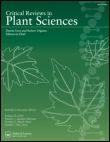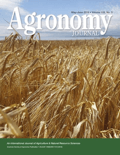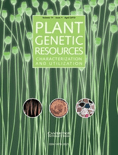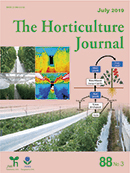
SABRAO Journal of Breeding and Genetics
Scope & Guideline
Elevating agricultural research to new heights.
Introduction
Aims and Scopes
- Plant Genetics and Breeding:
The journal emphasizes research on the genetic basis of traits in various crops, including studies on heritability, genetic gain, and breeding strategies to enhance yield and resilience against diseases. - Molecular Biology Techniques:
It adopts molecular biology methodologies such as DNA markers, PCR, and genome editing (e.g., CRISPR/Cas9) to investigate genetic variations and develop improved crop varieties. - Physiological and Biochemical Studies:
Research on how environmental factors influence plant physiology and biochemistry, particularly under stress conditions such as drought, salinity, and nutrient deficiencies. - Sustainable Agriculture Practices:
The journal promotes studies that integrate traditional breeding with modern biotechnological approaches to develop sustainable agricultural practices that enhance crop productivity and environmental health. - Diversity and Conservation of Germplasm:
A focus on the assessment of genetic diversity in plant species, including wild relatives, to support conservation efforts and the utilization of genetic resources in breeding programs.
Trending and Emerging
- Biotechnological Innovations:
There is a growing trend towards the application of biotechnological innovations, such as CRISPR/Cas9 and marker-assisted selection, to improve crop traits and develop resistant varieties. - Climate Resilience and Stress Tolerance:
Research focusing on plant responses to climate-related stressors, such as drought and salinity, is gaining traction, reflecting the need for crops to adapt to changing environmental conditions. - Sustainable and Organic Practices:
An increasing number of studies are emphasizing sustainable agricultural practices, including the use of organic fertilizers and bio-stimulants, to enhance soil health and crop productivity. - Interdisciplinary Approaches:
Emerging themes highlight the integration of various scientific disciplines, including genetics, physiology, and ecology, to tackle complex agricultural challenges. - Diversity and Conservation Studies:
There is a renewed interest in the genetic diversity and conservation of plant species, particularly in relation to their potential use in breeding programs.
Declining or Waning
- Chemical Fertilization Focus:
There is a noticeable decrease in research centered solely on chemical fertilization as the primary means of enhancing crop yield, with a shift towards integrated and organic approaches. - Traditional Breeding Techniques:
The reliance on traditional breeding methods without the incorporation of modern molecular techniques is waning, as more studies are integrating genetic and biotechnological methods. - Narrow Crop Focus:
Previous years saw a broader focus on a variety of crops; however, recent publications are increasingly homing in on a select few, such as rice and maize, which may limit the journal's diversity in crop research.
Similar Journals

CRITICAL REVIEWS IN PLANT SCIENCES
Transforming understanding in agricultural sciences.CRITICAL REVIEWS IN PLANT SCIENCES, published by Taylor & Francis Inc, is a prestigious journal that has been advancing the field of plant science since its inception in 1983. With an impressive impact factor and consistently ranked in the top quartile (Q1) of its category, this journal is a leading platform for the dissemination of peer-reviewed research that spans the breadth of plant biology, ecology, and agricultural applications. Housed in the United Kingdom, it serves an international readership, making significant contributions to our understanding of plant systems and their environmental interactions. This journal is highly regarded within the Scopus rankings, holding an impressive position of 18 out of 516 journals in the Agriculture and Biological Sciences category, placing it in the 96th percentile. Although not currently open access, the journal provides valuable insights and critical reviews that are essential for researchers, professionals, and students striving to further their knowledge and bolster their own research in plant sciences.

THEORETICAL AND APPLIED GENETICS
Connecting theoretical frameworks with practical solutions in genetics.THEORETICAL AND APPLIED GENETICS, published by Springer, is a premier journal that has significantly contributed to the fields of Agronomy, Crop Science, Biotechnology, and Genetics since its inception in 1933. With a solid reputation reflected in its Q1 ranking across multiple disciplines for 2023, this journal provides a vital platform for the dissemination of high-quality research that advances our understanding of genetic principles and their applications in agriculture and biology. The journal's indexed status and high impact factor indicate its vital role in shaping contemporary genetic research, marking it as an essential resource for researchers, professionals, and students seeking to stay at the forefront of these dynamic fields. Although it currently does not offer Open Access options, the journal ensures that quality studies are accessible through institutional subscriptions, supporting an informed community of scientists dedicated to innovation in genetics and applied biological sciences.

Plant Biotechnology Reports
Exploring Innovations in Plant SciencePlant Biotechnology Reports is a premier academic journal published by SPRINGER, focusing on cutting-edge research in the dynamic fields of biotechnology and plant sciences. With an ISSN of 1863-5466 and an E-ISSN of 1863-5474, this journal serves as a vital platform for disseminating high-quality studies from 2008 to 2024. Situated in Japan, it has earned commendable status within the academic community, ranking in the Q2 quartile for Plant Science and Q3 for Biotechnology in 2023, placing it among the top-tier publications in its domain. Notably, it ranks #160/516 in the Scopus category for Agricultural and Biological Sciences - Plant Science, reflecting its impact and reach in the relevant fields. While it does not currently offer open access, the journal remains an essential resource for researchers, professionals, and students eager to explore breakthroughs in plant biotechnology. Researchers contribute significant advancements that not only drive scientific understanding but also foster innovation in agricultural practices, making this journal pivotal for both academic and practical applications in the realm of biotechnology.

Revista Fitotecnia Mexicana
Empowering Professionals Through Cutting-Edge ResearchRevista Fitotecnia Mexicana is a prominent academic journal published by the SOC MEXICANA FITOGENETICA, dedicated to advancing knowledge in the fields of agronomy, crop science, genetics, horticulture, and plant science. With its establishment dating back to 2007 and currently running through 2024, this journal serves as an important platform for researchers, professionals, and academic institutions interested in plant genetic resources and agricultural innovations. Although it holds a Q4 quartile ranking in various categories and is positioned within the lower percentiles in Scopus rankings, it provides crucial insights and opportunities for emerging ideas and local research initiatives. Based in Mexico, and with its indexed ISSN 0187-7380, the journal plays an important role in stemming from the rich agricultural heritage of the region. The lack of open access options underscores the depth of curated content provided, making it a valuable resource for professionals seeking to expand their expertise in the sector.

AGRONOMY JOURNAL
Empowering Crop Science with Decades of InsightThe Agronomy Journal, published by Wiley, is a leading platform for cutting-edge research in the field of agronomy and crop science. Established in the United States, this prestigious journal carries the ISSN 0002-1962 and E-ISSN 1435-0645, with its coverage spanning from 1976 to 2024, showcasing a wealth of knowledge over decades. The journal is recognized in the top quartile (Q1) of its category, making it a highly respected source for quality literature, ranking #108 out of 406 in the Scopus database and reflecting a 73rd percentile standing in agricultural and biological sciences. While it operates under traditional access options, its commitment to disseminating valuable scientific inquiry aligns with the objectives of advancing sustainable agricultural practices globally. The Agronomy Journal serves as an indispensable resource for researchers, professionals, and students eager to stay abreast of significant advancements and discussions influencing the future of crop science and agronomic research.

Plant Genetic Resources-Characterization and Utilization
Bridging Science and Sustainability in Plant GeneticsPlant Genetic Resources-Characterization and Utilization, published by Cambridge University Press, is an esteemed journal in the field of plant science, particularly focusing on the genetic resources crucial for agriculture and crop improvement. With an ISSN of 1479-2621 and an E-ISSN of 1479-263X, this journal serves as a vital platform for researchers aiming to advance the understanding of genetic variation and its applications in plant breeding and conservation. The journal boasts an impressive positioning within its categories, achieving Q2 in Agronomy and Crop Science, Q4 in Genetics, and Q3 in Plant Science as of 2023, which reflects its commitment to publishing high-quality research. Although primarily subscription-based, the journal is accessible to institutions and individuals seeking to stay at the forefront of innovations in plant genetic resources. Researchers, professionals, and students alike will find valuable insights into the latest methodologies, findings, and implications for sustainable agriculture and ecosystem management in its pages. As a key resource for advancing knowledge and practical applications in its field, Plant Genetic Resources-Characterization and Utilization continues to significantly contribute to the scientific community and the understanding of plant biodiversity.

aBIOTECH
Pioneering discoveries in biotechnology and beyond.aBIOTECH, published by SPRINGERNATURE, is a premier academic journal dedicated to advancing the fields of biotechnology, agronomy, and molecular biology. With an impressive ISSN of 2096-6326 and E-ISSN 2662-1738, this journal has established itself as a vital resource for researchers and professionals aiming to publish high-quality, impactful studies. Based in Singapore, aBIOTECH has achieved remarkable recognition, boasting a Q1 ranking in multiple categories including Agronomy and Crop Science, Biochemistry, and Genetics in the 2023 Scopus rankings. Its solid position in the 90th percentile for Biochemistry and Genetics reinforces its significance within the global scientific community. The journal covers a broad spectrum of topics relevant to both basic and applied research, facilitating a shared dialogue amongst scientists and encouraging collaborative progress in innovative biotechnological applications. The open-access nature of the journal ensures that cutting-edge research is freely available, fostering a global exchange of ideas that is critical to the advancement of science today.

Horticulture Journal
Advancing Horticultural Excellence WorldwideThe Horticulture Journal, published by the Japan Society for Horticultural Science, is a leading academic platform dedicated to the advancement of horticultural research and practices. With an ISSN of 2189-0102 and an E-ISSN of 2189-0110, this journal endeavors to publish high-quality research that emphasizes innovative techniques, sustainable practices, and the science of plant cultivation. The journal has been recognized for its impact within the field, currently holding a Q2 ranking in Horticulture and a Q3 ranking in Plant Science as of 2023, indicating its significant contribution to advancing knowledge. With its open-access model, researchers, professionals, and students have the opportunity to engage with the latest findings, thanks to the journal's commitment to widespread dissemination of information. Since its convergence period began in 2015 and continuing through to 2024, the Horticulture Journal remains instrumental in promoting sustainable and beneficial practices in horticulture science globally.

Czech Journal of Genetics and Plant Breeding
Advancing genetic innovation for a sustainable future.Czech Journal of Genetics and Plant Breeding is a premier academic journal dedicated to advancing the fields of genetics and plant science. Published by the esteemed Czech Academy Agricultural Sciences, this journal has been available as an Open Access resource since 2002, ensuring that essential research is freely accessible to a global audience. With an ISSN of 1212-1975 and an E-ISSN of 1805-9325, it continues to disseminate high-quality studies and findings from the vibrant scientific community in the Czech Republic and beyond. The journal operates within the Scopus ranks, securing 279th place in the category of Plant Science and 282nd in Genetics, reflecting its commitment to scholarly rigor. The Journal's objectives focus on exploring innovations in genetic research and plant breeding methodologies, offering valuable insights that foster collaboration among researchers, professionals, and students alike. As the journal converges from 2007 to 2024, it remains a vital publication for those seeking to stay abreast of developments in genetic diversity, crop improvement, and sustainable agriculture practices.

Plant Science Today
Innovating today for a greener future in plant sciences.Plant Science Today is a prominent journal dedicated to advancing the field of plant sciences through innovative research and comprehensive reviews. Published by HORIZON E-PUBLISHING GROUP in India, this open-access journal has been actively disseminating knowledge since its inception in 2018, with a convergence period extending to 2024. With an ISSN of 2348-1900 and a growing reputation, it is categorized in various quartiles for 2023, notably achieving Q3 in Biochemistry, Genetics and Molecular Biology (miscellaneous), while it holds Q4 rankings in critical fields including Ecology and Plant Science. As a valuable resource for students, researchers, and professionals, Plant Science Today aims to inspire discussion and innovation in the realm of ecological and plant science disciplines, where it currently ranks within the lower percentiles in prominent categories such as Environmental Science and Agricultural and Biological Sciences. The journal serves as a crucial platform for the exploration of experimental and theoretical advances, fostering a community eager to explore plant biology's complexities.